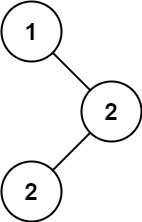LeetCode in Kotlin
501. Find Mode in Binary Search Tree
Easy
Given the root of a binary search tree (BST) with duplicates, return all the mode(s) (i.e., the most frequently occurred element) in it.
If the tree has more than one mode, return them in any order.
Assume a BST is defined as follows:
- The left subtree of a node contains only nodes with keys less than or equal to the node’s key.
- The right subtree of a node contains only nodes with keys greater than or equal to the node’s key.
- Both the left and right subtrees must also be binary search trees.
Example 1:

Input: root = [1,null,2,2]
Output: [2]
Example 2:
Input: root = [0]
Output: [0]
Constraints:
- The number of nodes in the tree is in the range
[1, 104]. -105 <= Node.val <= 105
Follow up: Could you do that without using any extra space? (Assume that the implicit stack space incurred due to recursion does not count).
Solution
import com_github_leetcode.TreeNode
/*
* Example:
* var ti = TreeNode(5)
* var v = ti.`val`
* Definition for a binary tree node.
* class TreeNode(var `val`: Int) {
* var left: TreeNode? = null
* var right: TreeNode? = null
* }
*/
class Solution {
fun findMode(root: TreeNode?): IntArray {
var maxOccurTimes = 0
var prevValue: Int? = null
var prevOccurTime = 1
val ans = hashSetOf<Int>()
fun updateGlobal(currValue: Int) {
if (currValue == prevValue) {
prevOccurTime++
when {
prevOccurTime == maxOccurTimes -> ans.add(currValue)
prevOccurTime > maxOccurTimes -> {
maxOccurTimes = prevOccurTime
ans.clear()
ans.add(currValue)
}
}
} else {
prevOccurTime = 1
prevValue = currValue
if (maxOccurTimes <= 1) {
ans.add(currValue)
}
}
}
fun processInOrder(node: TreeNode? = root) {
if (node != null) {
node.left?.let { processInOrder(it) }
updateGlobal(node.`val`)
node.right?.let { processInOrder(it) }
}
}
processInOrder()
return ans.toIntArray()
}
}

